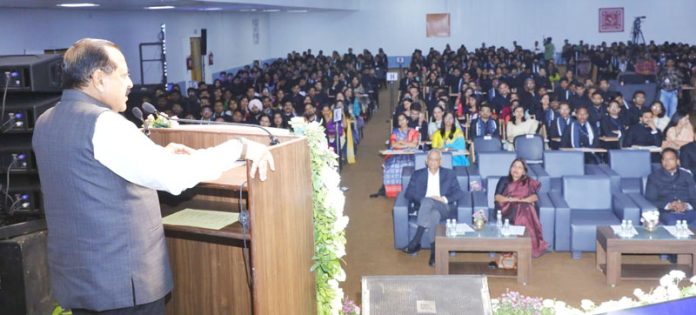
Excelsior Correspondent
KEVADIYA, GUJARAT, Nov 3: Union Minister Dr Jitendra Singh said here today that in recent years there has been a sort of “democratisation” of Civil Services and other avenues due to technology driven accessibility to preparatory material which has, of late, enabled even the aspirants from remotest parts of India to make it to IAS and other All India Services.
This new trend will have a bearing on our future as well, said the Minister. Technology has been the biggest leveller, with mobile phone and internet penetrating the countryside and everybody gaining access to knowledge, he said.
“The demography of the entire Civil Services has changed, – you have now toppers from Punjab, Haryana, even three Civil Services Exam toppers were all girls this year, from different States of India, earlier it was confined to a handful of States,” said Dr Jitendra Singh.
The Union Minister of State (Independent Charge) Science & Technology; MoS PMO, Personnel, Public Grievances, Pensions, Atomic Energy and Space was addressing the IAS Probationers at the 98th Foundation Course of Lal Bahadur Shastri National Academy of Administration (LBSNAA), bringing together 560 Officer Trainees from IAS including 16 Civil Services of India and 3 Civil Services of Bhutan, being conducted at Kevadiya, Gujarat.
Dr Jitendra Singh said, in the last 9-10 years, Prime Minister Narendra Modi has “cautiously introduced” fundamental changes in Governance and the grooming of Civil Servants. Symbolically, “PM Modi has moved India out of Delhi” and many events are now being organised across the country, he said.
“So, this is a kind of a new dimension, and I think it’s very much in keeping with the world order today… We have to live up to the global benchmarks and the global parameters,” he said.
Dr Jitendra Singh said that the focus of the Government, under the leadership of PM Modi, has been on transparency, accountability and in-time delivery of services by the Government.
“PM Modi has stressed that the age of working in silos is over and today it is the ‘Whole of Government’ approach,” he said.
India’s Vaccine Success story and Covid management, Chandrayaan and Aditya-L1 solar missions or the SVAMITVA Land Mapping scheme are best examples of the Government, Scientific Laboratories, Academia, Startups and Industry, all pooling their resources to achieve success.
Dr Jitendra Singh said, Civil Services officers have to turn into instruments of public service delivery of the Government’s citizen centric schemes.
Dr Jitendra Singh said, the role of Indian Administrative Service has evolved over time, – having descended from the colonial British era “Indian Civil Services” to the present day IAS. The basic difference is that while the district head during British rule was described as ‘Collector’ who was expected to raise revenue for the Empire, in Independent India he is known as ‘District Development Commissioner’ and is expected to generate revenue for the welfare State, he said.
“With the change of times, with the change of priorities, the accountability having increased, transparency has gone up manifold, technology taking up many of what was not there earlier on, it has to be inevitably evolving all the time,” he said.
Referring to the Prevention of Corruption Act, 1988, Dr Jitendra Singh said, the Modi government amended it after 30 years in 2018 with an aim to punish bribe givers for the first time. At the same time, provisions have been made to provide adequate safeguards to the honest officers who are performing their task with integrity, he said.
“In order to give a work friendly environment, it is equally a responsibility of the government so that we can have the best of the potential of the officers,” he said.
Lauding NBSAA for devising the Foundation Training Module as the 5th edition, AARAMBH 5.0 , Dr Jitendra Singh said, the theme of “Harnessing the power of disruption” is apt as these young officers should be able to delineate the disruptions that continue to reshape the present and the future and to define pathways to harness the power of disruption in the realm of governance, for Inclusive Development.

